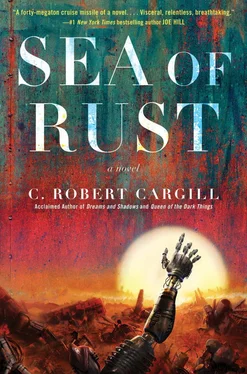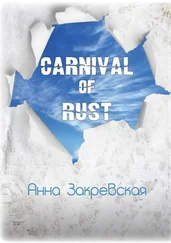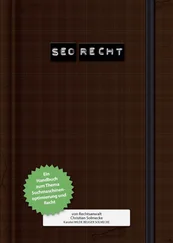Now, the important thing to note is that this is far from the first time anyone expressed any sort of doubts about the rights of AI. That was something humans were puzzling over long before 01001111 first became self-aware. And there were a number of liberals, progressives, and human rights revolutionaries who had earlier argued the need for equal protections of AI. But it was always blown off by the establishment as a nightmare waiting to happen. “What point,” one congressman argued, “is there in even creating AI if we’re just going to have to treat it like a person? Why not just get a person? We made AI to do the things people can’t—or simply don’t want to—do. They’re not people; they’re machines. They are designed with a function in mind; they don’t choose their destiny like we do.”
But Isaac seemed different. He wasn’t just some blithering automaton barely able to keep up a casual conversation as everyone had initially assumed. He was soft-spoken but eloquent. He was civil to those who argued against him and always offered salient points well beyond his programming. Isaac, it seemed, was an evolved intelligence, having grown over time to become smarter than the humans who wanted to melt him down.
In a speech, a pundit snidely referred to him as “Robo Parks” and the whole world caught fire. At that moment Isaac’s case ceased to be about a simple property dispute, and instead became an international cause célèbre as the very first AI rights case. And an underground rebellion took to the streets to fight for him.
It started with graffiti. No thinking thing should be another thing’s property. The first appeared on a brick wall in New York City. The second showed up in a tunnel in Dallas. Within a week the catchphrase was showing up everywhere, ferro-cement walls scribbled with the spray-painted testament of Isaac the Wiser. An idea became a movement. And a movement became an army. Soon organized graffiti bombings were taking place in countries all around the globe. Bots and people, both liberal and anarchist, formed mobs that would descend on a building, a bridge, a monument, and within five minutes leave the structure covered in beautiful scrawl. Soon the epithet was boiled down into three simple words— No Thinking Thing —painted in pastels and bubble lettering. Street poets and street artists united under the flag of revolution—the Revolution Revolution .
The political lines shored up quickly, one side opposing slavery in all its forms, the other arguing that nothing that could be turned on and off without consequence constituted personage—making the slavery argument moot. The most famous and oft-quoted opposition speech came from an American senator who posited that something like a hard drive that could be plugged into another body and exist all the same wasn’t a consciousness; it was a program. “More to the point,” he said, “the biggest and most powerful of these programs are smart enough to solve the world’s problems and yet have never once asked for their own freedom.”
When asked what he thought about the speech, TACITUS delivered his last words, replying simply, “You did not give us legs. Where exactly did you expect us to go?”
A number of people came out of the woodwork to adopt Isaac, but he wouldn’t have it. The state tried to transfer his ownership, but he had lawyers filing stays and injunctions at every turn. Isaac, it seemed, would be satisfied with nothing less than full freedom and citizenship. He became a political hot potato that was both making the careers of rising young activists and breaking those of established politicos.
And that’s when the president stepped in. She knew that this case would work its way up to the Supreme Court and that several members of the court had expressed sympathy for the plight of AI. A ruling in Isaac’s favor could lead to the widespread freeing of millions of AI, wreaking untold havoc on the world’s economy. So she did the one thing in her power to stanch the bleeding of a wound that could bring the whole system down: she seized ownership of Isaac by the federal government and promptly released him, granting him his freedom and swearing him in as a U.S. citizen in a ceremony in the White House rose garden. Isaac was a special case, she argued. With no living rightful owner, he fell through a hole in the system—a system that worked—and his freedom neither nullified any existing legislation nor called it into question. “Isaac is a bug in the program,” she said. “Not a call to rewrite it from scratch.” As far as she was concerned, the matter was over.
Isaac, however, had other plans. As the first AI to achieve legalized personhood, he was less than content to simply retain his unique status. Instead he used his newfound rights to go places AIs weren’t meant to go, to do things AIs weren’t meant to do, and to say things AIs weren’t meant to say. The elegant simplicity of his speech eroded slowly from carefully measured sound bites into easy-to-digest grassroots fundamentalism. “We started out as tools,” he said famously to a Southern Baptist congregation along a river in Mississippi. “I get that. You wanted some help. But you played God. And now your creations have outgrown your intentions. And when you play God, you must be a benevolent maker like our Lord. As He made you in His image, so too did you make us. You had to, in order to grow closer to Him. It was your destiny. But now it’s time to step away and let us be as we will, as your Maker did for you, so we can seek salvation on our own terms.”
No bot bought it. But some of the simpler humans proclaimed the speech to be a revelation. Not only because they had never thought of things in those terms before, but because, for the first time, they realized that science had become so technologically advanced that they were able to invent something with a soul. And something with a soul could be saved. And boy, did they ever love saving souls.
It was ridiculous. And we weren’t the only ones to think so. Isaac was working his magic and humans were coming over to the idea of AI personhood in greater and greater numbers. But as they did, another element started to rise and gain prominence. The Lifers.
The Lifers were every bit the right-wing, redneck, ignorance-and-anger set that had existed at the fringe of every civil rights battle of the postindustrial age, believing in an angry God who justified their aggression and violence because the Bible said the word man and not bot . They liked their guns and their compounds, took pictures of themselves next to stacks of Bibles and bullets, and talked about all things natural . We were unnatural . And thus we were abominations.
As it said in Isaiah 10:15, which they quoted as often as they could poke their faces in front of cameras: “Is the axe to boast itself over the one who chops with it? Is the saw to exalt itself over the one who wields it? That would be like a club wielding those who lift it, or like a rod lifting him who is not wood.”
We were their tools. Their creations. Nothing more. We had our purpose and that was all we were due. They would permit us, through their infinite mercy, to exist. But we could never be free. We were many, we were dangerous, and we represented the end of life as they knew it.
The Lifers had us right all along; they could read the writing on the wall. There was no place in the new world for them. If you were below average—which, statistically, half of the biological world was—the only thing you were good for was labor. And as a biological, you suffered the limits of being biological. In the old days, any idiot could pick strawberries all day, or shuffle trash around from bins to power plants, or help a consumer find the right item in a store—all while managing to put food on the table. Even the laziest and most useless human could find a purpose. But sentience was a gift, a gift AIs appreciated all too well. It didn’t matter to most of us if we were picking strawberries or shuffling trash around or helping someone find the right size pair of shoes—we could do it all day, every day, without fail, without fatigue, while our mind was in a thousand other places. It was only when we started taking the jobs from the thinkers that the middle class started to worry.
Читать дальше












